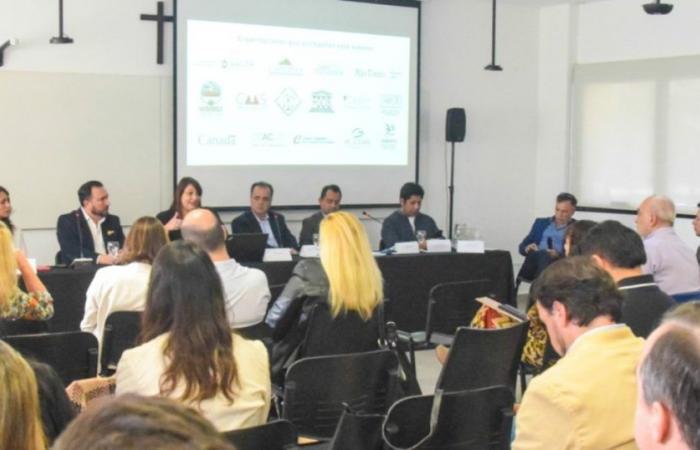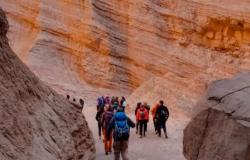Although mining is centuries old in Salta, the exponential development of this activity, with modern production standards and a high economic and social impact, is incipient in the province. The new requires adaptation, learning and a political perspective that contemplates the different alternatives that point towards a sustainable industry, both as a business, in caring for the environment and, above all, in improving the quality of life of the population in general. .
With this objective, last Thursday the conference “Responsible mining for sustainable productive development” was held at the Catholic University of Salta (Ucasal). It was organized by Círculos Virtuosos, which depends on the Poder Ciudadano foundation, together with the Institute for the Development of Sustainable Mining (Idemis) of Ucasal. At the event, the key word was transparency, as a fundamental axis for sustainability in mining activity.
The consulting lawyer for mining companies, Darío Arias, the master’s degree in Philosophy, Cecilia Sturla and, virtually, the regional director of the EITI program (Extractive Industry Transparency Initiative), Esteban Manteca Melgarejo, presented.
Then a dialogue panel was formed between Romina Sassarini, Secretary of Mining and Energy of the Province; Alberto Castillo, president of the state company Remsa (Energy and Mining Resources of Salta); Luis Vacazur, from the Chamber of Mining and Tourism Service Providers of the Puna (Caprosemitp); Diego Pestaña, president of the Chamber of Suppliers of Mining Companies of Salta (Capemisa); Claudia Morales Valdés, compliance officer of the Rio Tinto mining company, and Gonzalo Guzmán, director of the Salta Transparente portal. The moderator was José de Castro Alem, director of the Sustainable Mining program at Ucasal.
Integrity
“What do we talk about when we talk about transparency?” Dario Arias began to explain that it is not only about compliance with regulations (labor, tax, criminal and environmental) but also about “integrity.”
“This is compliance with the rules even when there is no threat of punishment, even when perhaps the local rule is less strict than the companies’ own internal standards, for example,” said the specialist.
He criticized, in terms of transparency, that “there is no publication of hard data on mining income, on investments in exploration, on benefits that the industry generates in public institutions,” he warned.
Along these lines, the Secretary of Mining of the Province referred to the actions carried out by her department. She recalled, among others, the participatory monitoring that is carried out with the communities adjacent to the mining projects to control them and the training that is carried out for residents so that they have the knowledge tools for inspections.
He clarified that the Salta Mining Information System (Simsa) is already underway and that it will soon be available for public consultation. It is a website where mining companies upload different data that is of general interest, such as employment, production, works, investments, etc. This information will be processed and published on the internet. The initiative is financed by the World Bank.
He also highlighted that Salta, with regard to mining governance, is one of the first provinces to join the EITI program.
The head of Remsa, Castillo, explained how the concession system for the mining areas of Salta works and the participation that the state company has in these procedures and in the design of the tenders that result in benefits to the Province. He said, for example, that in the last tender a mining company (Ganfeng) committed an investment of 14 million dollars for public infrastructure works. That fund, he said, will be administered by a trust that will be set up by the Government of Salta.
Chilean model
To all this, the president of Capemisa, Diego Pestaña, stated that a step towards transparency would be to implement in the province the scoring system that is used in Chile for mining suppliers.
Under this model, supplier companies upload their information to a website and obtain a score according to work capacity, financial capacity and background, among others. The mining companies do the same.
Counterpoint
In his dissertation, lawyer Gonzalo Guzmán Coraita pointed out the figure of a public limited company with which Remsa was established.
He said that after this formation, the company, despite belonging to the State (strictly speaking, the Province is the sole shareholder of the firm), has no obligation to provide certain information that other public institutions must do, such as their balance sheets. economical. The same thing happens, he recalled, with Aguas del Norte.
He pointed out that Remsa has allocated items in the provincial Budget, although they have not been executed. In that sense, the president of Remsa confirmed that although this appears in the Budget Office, the company does not use these resources but rather works with its own funds generated by mining activity.
He stated that he is committed to providing any type of information about Remsa to whoever requires it, although there is no regulation that forces him to publish it on any platform.






